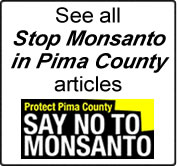Non-GMO Month: The Time to Stand Up and Create a Non-GMO Movement
by Melissa Diane Smith
October 10th (10-10-10) is National Non-GMO Day and October is National Non-GMO Month. There is no better time to get educated about genetically modified foods, the dangers associated with them, and how to avoid them so we can create a movement to stamp GMOs out of our food supply and take back our right to real food. In fact, I feel so strongly about educating people about this topic that I am going to add “Just Say No to GMOs” as one of the many nutritional subjects I can be contacted to speak about (either by itself or in conjunction with my gluten-free or going against the grain talks) to both mainstream and health professional groups.
A GMO (genetically modified organism) is the result of a laboratory process of taking genes from one species and inserting them into another. Fifty-three percent of Americans say they wouldn’t eat GMO-containing foods if the foods were labeled. Unfortunately, in a real move against consumer safety, our government has allowed GMO-laden foods not to be labeled. So, it is up to us to get educated about where GMOs are found and how to avoid them.
Corn is the GMO-laden food that most Americans and most people who eat gluten free are likely to be eating without knowing it is genetically modified, and it carries risks to our health and the environment. Check out these earlier stories to learn more about the dangers of GM corn:
Replacing Wheat with Corn? Most Corn is Genetically Engineered
Genetically Engineered Corn May Cause Allergies, Infertility, and Disease
Move Another Step Toward Improved Health by Taking the No-GMO Challenge
SPECIAL REPORT: Food for Thought to Protect Health in the New Decade
Three Approved Types of GM Corn Linked to Organ Damage, New Study Shows
Along with corn, there are other foods that are likely to be genetically engineered (unless labeled organic and non-GMO). They are: soybean, canola, cottonseed, most Hawaiian papaya, sugar from sugar beets, small amounts of zucchini and yellow squash, and milk products from cows that have been injected with bovine growth hormone. (If something isn’t done to stop it, salmon will soon be added to that list!) Avoid these foods, or seek out organic varieties of these foods or foods labeled with “Non-GMO Project” verified seals. If just 5 percent of the population stands firm against buying and eating GMOs, we can create a tipping point of consumer rejection that takes GMOs off the market nationwide. (People in Europe and India have protested even more loudly by sabotaging GMO crops through burning, cutting, or uprooting GMO crop fields! Read the story “GMO Crop Sabotage on the Rise.”)
To become more educated about GMOs, check out the following resources:
GE Salmon? Are You Out of Your Minds?
Maintaining the integrity of the foods we eat is the most important factor we need for protecting our individual and collective health. So, right now during Non-GMO Month, take a stand against GMOs and spread the word to family, friends, and coworkers.
We have a lot more power as consumers than we realize. Let’s flex our muscles together and show the big food corporations that are sneakily pushing GMO foods on us who’s boss.
Copyright © 2010 Melissa Diane Smith
